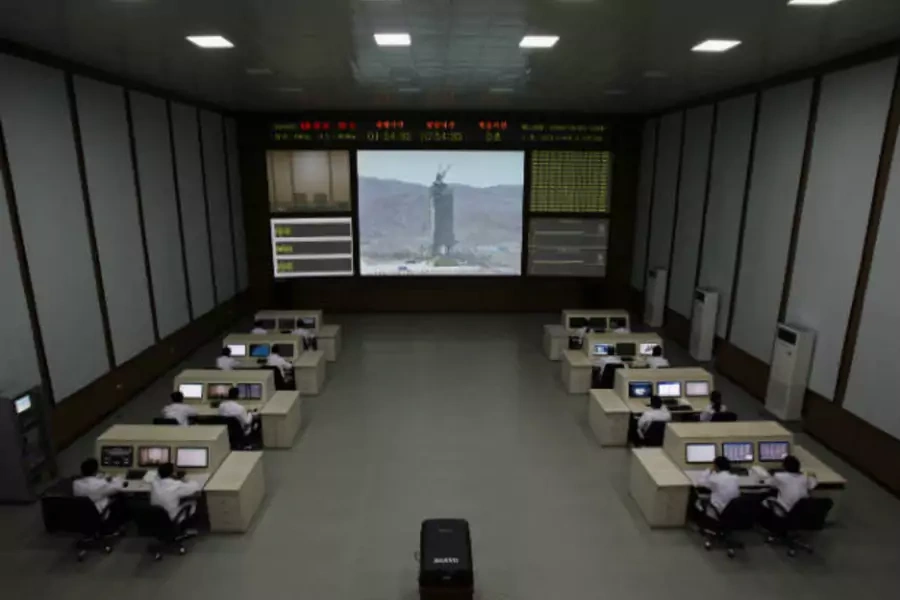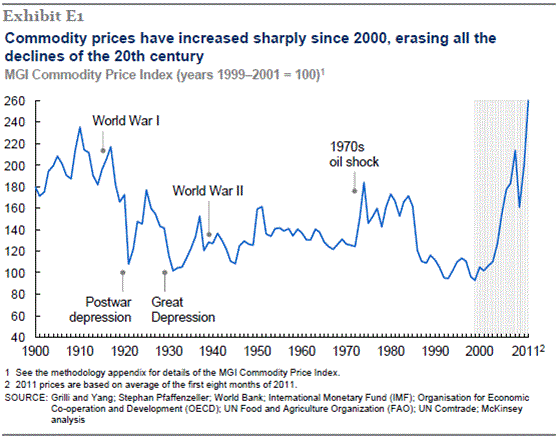Friday File: How Will Obama Respond to the North Korea Missile Test?

More on:
Above the Fold. Despite warnings from President Obama that there would be “consequences,” North Korea went ahead and launched a ballistic missile to honor the 100th birthday of the country’s founder, Kim Il-sung. The test was a dud; the missile broke up a minute into flight and fell harmlessly into the Yellow Sea west of Seoul. The launch violates a series of UN resolutions and means the end of the so-called Leap Day deal in which Washington promised to send food aid to North Korea in exchange for good behavior. Presumptive GOP nominee Mitt Romney was quick to issue a statement accusing Obama of a “naive” effort to “appease” a regime that “poses a clear and growing threat to the United States, one for which President Obama has no effective response.” But while Romney was crystal clear in his condemnation, he offered no good answer to the one question that matters, “So what would you do?” That might be because there isn’t one. Successive U.S. presidents have tried and failed to corral Pyongyang. That includes George W. Bush, on whose watch North Korea went nuclear and hardly someone who can be accused of appeasing foreign foes. The fact is that North Korea holds Seoul hostage—the twenty-five million people who live in the South Korean capital live within range of North Korean artillery and missiles—making Washington understandably reluctant to risk war. The one country that has cards to play with Pyongyang is China. But so far Beijing has been unwilling to play them. In the days leading up to the missile launch, Chinese leader Hu Jintao was sending new North Korean leader Kim Jong-un “sincere good wishes for the cause of building a prosperous and strong country.” Don’t expect Chinese leaders to be sending Pyongyang a different message anytime soon. Until that changes, North Korea is going to frustrate American presidents, even ones who question the determination of their predecessors.
CFR Event of the Week. Brazilian president Dilma Rouseff was in Washington, DC, this week to meet with President Obama. The White House did not designate the meeting a “state visit,” leading some commentators to wonder if the United States was “dissing” her and Brazil’s rising power. There was also speculation that the two leaders “disagree more than they agree,” especially on the question of diplomatic relations with Iran. Questions like these need context, and CFR was fortunate enough to have Donna J. Hrinak, president of Boeing Brazil, and Julia E. Sweig, CFR’s Nelson and David Rockefeller Senior Fellow for Latin America Studies, sit down with NPR’s Edward Schumacher-Matos for a meeting on “Assessing U.S.-Brazil Relations.” Hrinak and Sweig covered a wide range of issues in the U.S.-Brazil bilateral relationship; the upshot is that things are good could but they could be much better. You can watch the video here or below, or listen to the audio. You also can check out the conclusions of CFR’s Independent Task Force on Global Brazil and U.S.-Brazil Relations,
Read of the Week. China and the Philippines are currently locked in a tense standoff over the Scarborough Shoal, which lies off the southwest coast of the Philippines. The stand-off started when a Philippine warship tried to arrest the crews of several Chinese fishing boats at anchor in the shoal, which Philippines claims as its territory. The Philippines claims that the Chinese were fishing illegally. The problem is that China also lays claim to the shoal, so it sent two surveillance ships to prevent the arrests. Result: a stand-off with neither side wanting to give an inch. The stare down is just the most recent example of why so many security experts worry about the potential for an armed clash in the South China Sea. It is dotted with thousands of small islands like the Scarborough Shoal, some rich fishing grounds, and potentially vast deposits of oil and gas. So who owns what is a matter not just of national prestige and possibly strategic advantage, but cold hard cash. As Bonnie Glaser points out in “Armed Clash in the South China Sea,” a report just released by CFR’s Center for Preventive Action, China is embroiled in territorial disputes in the South China Sea with Brunei, Malaysia, the Philippines, Taiwan, and Vietnam. America’s traditional principle of freedom of the seas is also at stake, as China insists it can bar ships from sailing in international waters that it claims as its own. Finding a fix that leaves everyone satisfied will be a heavy lift.
Blog Post of the Week. Fred Kaplan is wondering whether the Israelis might hand President Obama an “October surprise” by attacking Iran’s nuclear sites in the fall. With an election in November, Obama would likely find himself forced by domestic political realities to back the Israelis to the hilt—or risk becoming a one-term president. But as Kaplan notes, if he can imagine this scenario, so too can officials in Iran. That, Kaplan thinks, just might give Iranian leaders an extra incentive to negotiate when its representatives sit down with delegates from the five permanent UN Security Council members plus Germany (the P5+1) for nuclear talks this weekend in Istanbul.
Poll Question of the Week. President Obama is headed to the sixth Summit of the Americas this weekend in Cartagena, Colombia. So how is he faring in the eyes of people south of the border? Not so well according to Gallup’s latest opinion briefing. His approval rating in Latin America is at a new low, 47 percent in 2011, down from 62 percent in 2009. The problem seems to be that many Latin Americans now doubt Obama’s ability to deliver on issues they care about. He is not likely to satisfy those he has disappointed any time soon. Many Latin Americans would like to see the United States rethink its war on drugs, do more to stem the flow of weapons south of the border, revamp its immigration policy, overhaul its trade policy, and end its futile effort to isolate Cuba. But 2012 is an election year. All those policies have staunch defenders in the United States, and as a general rule, presidents don’t pick fights with important constituencies as voters are getting ready to head to ballot booth.
Chart of the Week. Does it seem like the price of everything is going up? It may not be your imagination. According to the McKinsey Global Institute, the cost of commodities—everything from oil, coal, and gas to coffee, cocoa, and rice to steel, aluminum, and tin—is up, way up. To put the point even more strongly, the rise in commodity prices over the past decade reversed a one-hundred-year-long fall in commodity prices over the course of the twentieth century. This is what happens when three billion more consumers enter the middle class and easily exploited resources are exhausted. Optimists say not to worry. Technology will adapt, consumption patterns will change, and prices will stabilize or fall. Pessimists look at the trend, contemplate how climate change might devastate traditional food-growing regions, and say--well, I can’t write what they say. But it’s not good.

Source: McKinsey Global Institute
Too Good Not to Note. Elliott Abrams doesn’t think Iran is on its best behavior, even if the title of his post says otherwise. Edward Alden relays some ideas on how to fix America’s infrastructure mess. Liz Economy looks at the challenges the Chinese politburo faces in the wake of the Bo Xilai scandal. Reza Marashi & Ali Reza Eshraghi speculate that Iran’s Supreme Leader Ali Khamenei might be willing to cut a deal with the United States on Iran’s nuclear program. Kori Schake thinks that the State Department should stop whining and start acting more like the Defense Department. Aaron David Miller may be getting ahead of himself, but he doesn’t think that President Obama will have any more success on the Israeli-Palestine issue in his second term. Michael Scherer tries to make sense of how the Latino vote is likely to shape the 2012 elections.
Perils of Prediction. “If Beethoven’s Seventh Symphony is not by some means abridged, it will soon fall into disuse." Philip Hale, American music critic, 1937. No need to roll over Beethoven. Orchestras still play the Seventh Symphony. Heck, it was even part of the soundtrack for The King’s Speech, which won an award or two as I recall.
Quote to Ponder. “It’s only when the tide goes out that you learn who has been swimming naked.” Warren Buffet.
A Reason to Smile. Having the opportunity to win a second consecutive Stanley Cup.
More on:
 Online Store
Online Store